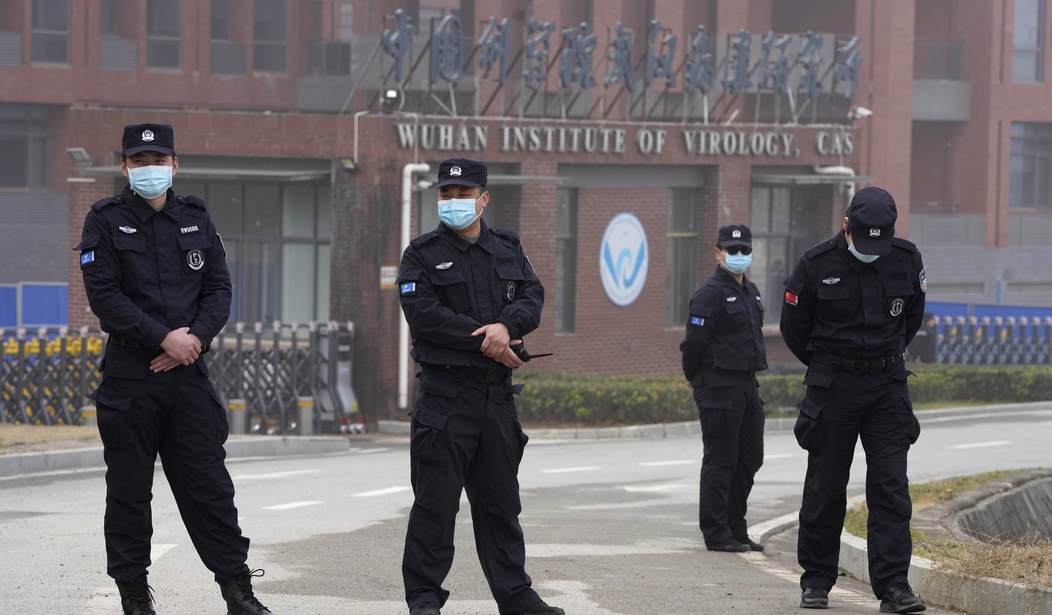In a move which should be shocking to absolutely nobody, China rejected the World Heath Organization's plan for a second phase of their study in the origins of the Wuhan coronavirus, as it will consider the possibility that it came from a lab leak at the Wuhan Institute of Virology. The rejection came Thursday local time from Zeng Yixin, the vice minister of the National Health Commission, according to Ken Moritsugu with the Associated Press.
Zeng said he was "rather taken aback" about the revelations:
Zeng Yixin, the vice minister of the National Health Commission, said he was “rather taken aback” that the plan includes further investigation of the theory that the virus might have leaked from a Chinese lab.
He dismissed the lab leak idea as a rumor that runs counter to common sense and science.
“It is impossible for us to accept such an origin-tracing plan,” he said at a news conference called to address the COVID-19 origins issue.
...
Zeng said the Wuhan lab has no virus that can directly infect humans and noted that the WHO team concluded that a lab leak was highly unlikely. He added that speculation that staff and graduate students at the lab had been infected and might have started the spread of the virus in the city was untrue.
White House Press Secretary Jen Psaki gave a lengthy response, though it lacked much substance.
Q Jen, today, China rejected a WHO plan for a second phase of an investigation into the origins of the coronavirus, including audits of laboratories and markets. What is the White House’s reaction to that? And how will this impact the U.S. dealing with China on this going forward?
MS. PSAKI: Well, let me first reiterate that we — the United States supports the WHO plan for phase two, which commits to ensuring these studies are scientific, transparent, expert-led, and free from interference.
We have certainly seen the PRC’s comments again rejecting phase two of a WHO study. We’re deeply disappointed. Their position is irresponsible and, frankly, dangerous. Alongside other member stat- — member count- — states around the world, we continue to call for China to provide the needed access to data and samples. And this is critical so we can understand to prevent the next pandemic. This is about saving lives in the future. And it’s not a time to be stonewalling.
I would note that we believe in a multilateral approach; that has not been an approach that has been taken prior to the President taken office — taking office, and that has been a big focus of his strategy — strategy as it relates to our engagement with China.
So — and that relates to our approach to global health security, which is why we rejoined the WHO on day one. Unfortunately, phase one, as you all know, did not yield the data and access from China that we think is necessary. But our support for a multilateral approach and the phase two plan is because it’s rigorous and science-based.
But most importantly, it’s not just the United States calling for this. As a part of our renewed engagement and our efforts to build a coalition of support around the world with allies and partners, we’re joined by the international community on this — partners and multilateral organizations who are also calling for and pressuring China to be engaged in the sta- — the second phase of this discussion.
I would also note — I’m almost done; there’s a lot to say about this topic. In Cornwall, which many of you were with us — with us for that trip, the G7 leaders, together, called for a transparent, evidence-based investigation, including in China. And after the phase one study, we were joined by allies and partners across the world in a joint statement calling for a transparent and independent analysis expressing our concerns over the lack of access and urging momentum.
It’s clear China isn’t living up to their obligations. What our focus is on is building this multilateral effort and support for putting pressure on and making clear that it’s unacceptable and dangerous.
When asked as a follow-up if "you foresee any consequences for China for this decision," Psaki demurred. "Well, I’m not going to get ahead of any policy process. I will tell you that, again, our approach to China, as it relates to global health security, is going to continue to be in a coordinated fashion with our international partners," she said.
Indeed, such a moved from the CCP is "dangerous," and there's no need to say one is being frank about it. It's also not at all surprising.
Recommended
Psaki touts that the Biden administration had us rejoining the WHO on day one, but it's hardly something to brag about, considering it's incompetent at best, and their phase one investigation was likely corrupted.
She also pointed to the calls for transparency from leaders at the G7 summit, which, as Katie reported at the time, likely means nothing will come out of it.
As Spencer reported, and as Moritsugu acknowledged in his piece, Dr. Tedros, the head of the WHO, just finally recently acknowledged that it was premature to rule out such a theory.
"Most experts don’t think a lab leak is the likely cause. The question is whether the possibility is so remote that it should be dropped, or whether it merits further study," Moritsugu claimed in his reporting.
However, this is not entirely true. Many experts have warned that the lab leak theory is a plausible one.
There's NIH scientist Kristian Andersen, who wrote in an email to Dr. Anthony Fauci on January 31, 2020, that the virus looked to be "potentially engineered."
Then there's Nicholas Wade, who, in early May, laid out a massive amount of evidence as to how the virus could have been a lab leak in this Medium piece.
Further, Dr. Richard Ebright, an American molecular biologist, a Board of Governors Professor of Chemistry at Rutgers University, and the Laboratory Director of the Waksman Institute of Microbiology, has been consistently forthcoming about how the lab leak theory should not have been written off.
A recent POLITICO-Harvard poll shows that even a majority of Democrats, at 52 percent, believe in the lab leak theory.
























